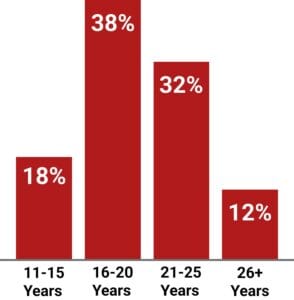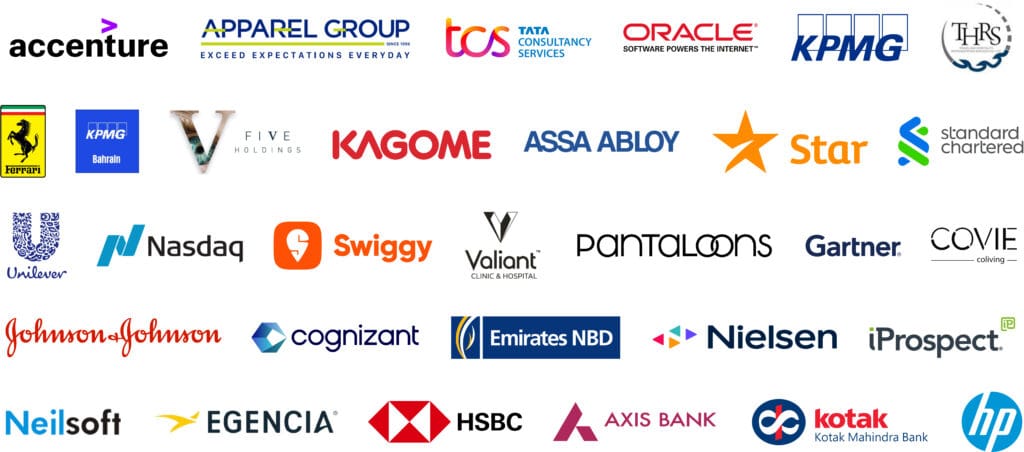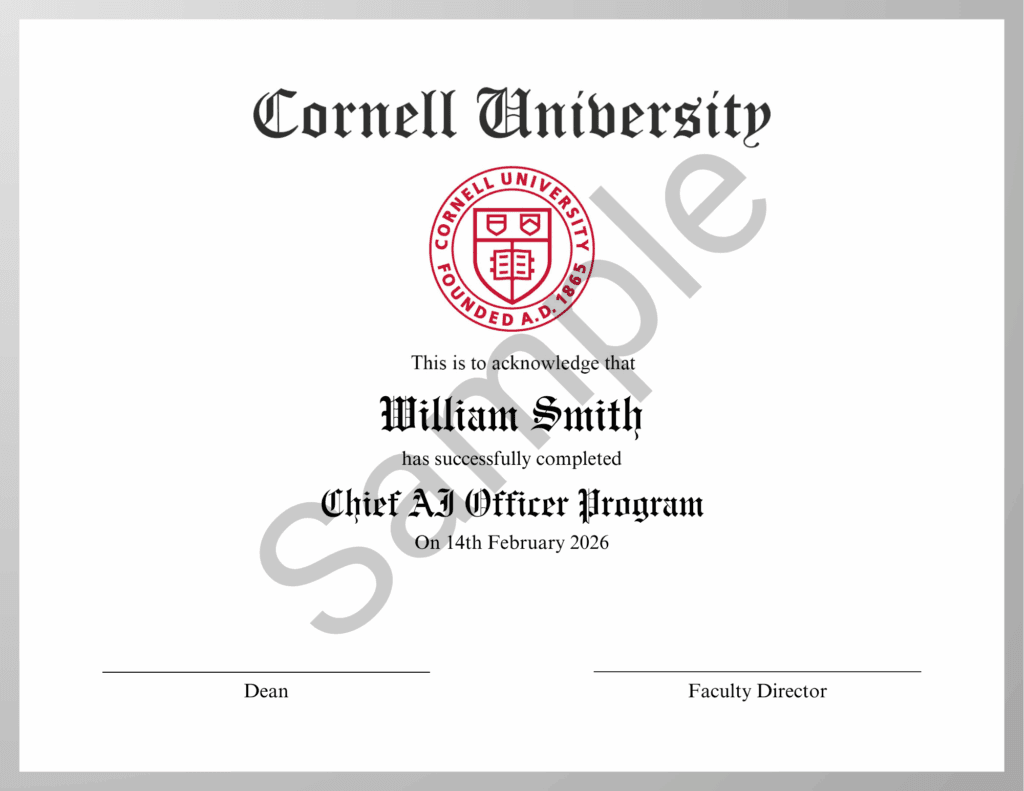
Get Your Brochure
Program Overview
AI in 2025 is way more than the ChatGPT of 2024. AI capabilities have rapidly advanced from text and visual generation in 2024, to doing advanced reasoning and autonomous agentic work in 2025. In effect, we already have widely accessible, limitless amounts of advanced intelligence.
These advances have the potential to usher in a business transformation akin to that from the invention of other general-purpose technologies such as the steam engine, electricity, the internet, etc. Organizations and individuals that prudently harness the potential of these technologies will gain a significant advantage, while those that get swept by the hype or fail to upskill and prepare risk obsolescence.
The Cornell Chief AI Officer Program prepares you to lead this AI transformation with clarity, confidence, and credibility. This experiential program with live interactive sessions, including working labs, builds fluency across the full stack of AI Transformation skills. You will select an organization or industry and apply insights from each session to create your AI Strategy Blueprint. In the final session, you’ll share your AI Strategy Blueprint with faculty for feedback and refinement.
Starts On
14 March 2026
Duration
6 Months
Program Fee
$4,800 USD
Program Benefits
16 live interactive sessions
AI Strategy Blueprint: 3 working lab sessions
AI Strategy Blueprint final report out and personalized feedback
Peer coaching and assessments
Access to Cornell’s library of 2000+ Courses
Access to exclusive curated AI track from the Cornell library
Certificate from Cornell University
Small cohort for learning impact
Curriculum
Module Outcomes
Leverage your deep understanding of AI and its underlying technologies and assess future advances.
AI in 2025: Limitless Super Intelligence on Tap
The session focuses on tackling the challenges of a diverse workforce. Moving beyond diversity towards equity and belongingness.
- Understand the trajectory of AI advancements and their implications for productivity, business models, and strategic advantage across industries.
- Develop a deep conceptual unbiased understanding of the underlying technologies—machine learning, reinforcement learning, pre-training, post-training, foundation models, large language models, reasoning models, etc.
The Technology: Perceptive, Generative and Agentic AI
- Gain an understanding of the cognitive capabilities, limits, operational and economic characteristics of perceptive, generative and agentic AI.
- Use a framework for understanding and assessing any future advances in AI.
Module Outcomes
Unleash creative thinking and lead innovation with a human-centered approach.
Design Thinking for AI Innovation
The session focuses on tackling the challenges of a diverse workforce. Moving beyond diversity towards equity and belongingness.
- Explore how AI and human-centered design thinking intersect to drive innovation.
- Understand the benefits, challenges, and real-world use cases of this integration to apply AI meaningfully in solving complex, high-impact problems.
Creativity and Innovation
- Challenge conventional assumptions to unlock breakthrough opportunities by linking creative thinking with disruptive innovation across the “who,” “what,” and “how” of value creation.
- Activate individual and team creativity to drive bold experimentation and scalable innovation.
Module Outcomes
Use your knowledge and hands-on experience with a series of deep, research-based frameworks for identifying transformation opportunities enabled by AI.
Work Redesign: Automation and Augmentation
- Learn where and how to use AI effectively to boost your productivity. Understand three key AI personas.
- Redesign jobs, work, systems and processes in your organization via automation, augmentation and increased value capture.
AI and Human Interactions
- Understand how individuals and teams interact with AI. Examine cognitive and behavioral patterns shaping trust, adoption, and collaboration.
New Business Models and Strategic Positions
- Identify new business models, redesigning business scope, clock speed and sequencing, employee and value chain engagement, pricing and incentive structures.
- Build a new strategic position, anticipate and react to changes in economic power in an ecosystem.
AI-Powered Decision Making
- Apply data-driven decision frameworks to identify, evaluate, and communicate AI use cases.
- Strengthen your ability to assess trade-offs, anticipate risks, and make high-quality decisions in AI-enabled environments.
Narrative Intelligence with AI Insights
- Translate insights into actionable narratives that drive alignment and strategic buy-in across stakeholders.
- Use narrative framing and strategic communication to simplify complexity, highlight value, and influence executive decisions.
Module Outcomes
Elevate your ability to make AI transformation happen.
Legal and Ethical Considerations
- Examine Legal and Ethical issues associated with AI ventures. Explore issues related to fairness, transparency, accountability, and regulatory response.
AI and Human Interactions
- Understand how individuals and teams interact with AI. Examine cognitive and behavioral patterns shaping trust, adoption, and collaboration.
Technology Update Panel
- Gain awareness of the latest research and findings on how customers, employees and organizations are collaborating with and reacting to AI — what is working in the wild and what is not.
De-Risking New Ventures and Your AI Strategy
- Apply a structured framework to test and refine AI initiatives.
- Learn how to manage uncertainty, conduct low-cost experiments, and scale validated solutions.
Leading Change in a Disruptive World
- Learn how to manage organizational change driven by AI.
- Build skills to navigate resistance, align stakeholders, and lead transformation efforts.
Leading High-Performance Teams with Humans and AI
- Develop strategies to lead teams where humans and AI systems collaborate to deliver outcomes.
- Build the skills to manage trust, alignment, and performance in environments shaped by intelligent technologies.
Communicate like a CEO: Differentiator for the AI Era
- Use tools to project presence, confidence, and clarity as an AI leader navigating complex systems and resistance.
- Strengthen your ability to communicate with credibility and impact in high-stakes settings.
AI Strategy Blueprint
Develop a rigorous AI Strategy Blueprint for your organization or selected industry. The blueprint will include:
- An assessment of short, medium and long-term productivity, business model innovation, and strategic opportunities and threats.
- Recommended short and medium-term transformation initiatives.
- A plan to derisk and refine the initiatives via series of escalating experiments.
- An architecture of the organizational structures and resources needed to execute this strategy.
Intensive Working Labs
- Work with industry experts on your AI Strategy Blueprint through structured labs: 3 group sessions of 30 minutes each.
- By the end of the program, you will have created a rigorous, actionable AI Strategy Blueprint.
AI Strategy Blueprint Report Out
- In the final session, you’ll present your AI Strategy Blueprint to peers and faculty for feedback and refinement.
- Your AI Strategy Blueprint will be your deliverable designed to inform executive decision-making or guide entrepreneurial execution.
Cohort Statistics
Work Experience

Average Work Experience: 21 Years
Industries
- Financial Services
- Information Technology
- Manufacturing
- Healthcare
- Real Estate
- Oil & Gas
- Consulting
- Hospitality
- Edtech
- Construction
- Telecommunication
- Retail
- Entertainment
- FMCG and Others
Designations
- Founder
- Partner
- Chairman
- Managing Director
- Executive Director
- President
- Group CEO
- Group CFO & COO
- Director of Finance
- Director – Communication & Marketing
- Chief Planning Officer
- Chief Digital Officer
- Chief HR Officer
- Senior Vice President
- AVP, Retail Analytics
Companies

Faculty (Indicative)
Industry Experts (Indicative)
Hear from Prof. Karan Girotra
Certificate

Upon successful completion of the program, participants will be awarded a digitally verifiable certificate by Cornell University
Note: Certificate image is for illustrative purposes only and may be subject to change at the discretion of Cornell University.
Who Should Apply?
Cornell Chief AI Officer Program is designed for emerging and current CXOs, senior leaders and executives, across geographies and industries, who desire to be agile in thinking and strategic in their approach towards building innovative AI solutions to steer business growth.
- 10+ years of work experience and proven success in leading high performing teams / impactful projects
- A minimum of a Bachelor's degree

Steve
Beta Version
Error sending message

Karan Girotra
Professor of Operations, Technology and Information Management
Karan Girotra is the academic lead for the flagship studio-based education programs at Cornell Tech and is applying his research on innovation to help build a new model for graduate education. As one of the first business faculty at Cornell Tech, he is helping build a unique new educational institution that fuses technology with business and creative thinking. He has collaborated with companies building new business models in the areas of urban living, smart transportation and e-commerce, helping them build rigorous research-based solutions.

Allan Filipowicz
Clinical Professor of Management and Organisations
Allan Filipowicz teaches Managing and Leading Organizations, Negotiations, Executive Leadership and Development, Leading Teams and Critical and Strategic Thinking. He was also a Former Dean for Executive Education. He has recently won a Best Core Faculty award. He has taught executives across the globe. His professional experience includes banking and consulting, including running his own boutique consulting firm and four years with the Boston Consulting Group in Paris.

Mor Namaan
Professor at the Jacobs Technion-Cornell Institute
Mor Naaman is Associate Dean for Faculty Affairs and Professor at the Jacobs Technion-Cornell Institute at Cornell Tech where he holds the Don and Mibs Follett Chair and in the Information Science Department at Cornell University, and currently serves as Associate Dean for Faculty Affairs (ADFA). Mor leads a research group looking at topics at the intersection of technology, media and democracy. The group applies multidisciplinary techniques - from machine learning to qualitative social science, to study our information ecosystem and its challenges, with a special focus on AI-mediated communication and its impact on society.

David Rand
Professor of Management Science and Brain and Cognitive Sciences
David Rand is the Erwin H. Schell Professor and Professor of Management Science and Brain and Cognitive Sciences at MIT, the director of the Applied Cooperation Initiative, and an affiliate of the MIT Institute of Data, Systems, and Society, and the Initiative on the Digital Economy. David received his BA in computational biology from Cornell University in 2004 and his PhD in systems biology from Harvard University in 2009, was a post-doctoral researcher in Harvard University’s Department of Psychology from 2009 to 2013, and was an Assistant and then Associate Professor (with tenure) of Psychology, Economics, and Management at Yale University prior to joining the faculty at MIT.

Frank Pasquale
Professor of Law
Frank Pasquale is Professor of Law at Cornell Tech and Cornell Law School. He is an expert on the law of artificial intelligence (AI), algorithms, and machine learning. His books include The Black Box Society (Harvard University Press, 2015) and New Laws of Robotics (Harvard University Press, 2020). He has published more than 70 journal articles and book chapters on topics ranging from technology policy to health law. He co-edited The Oxford Handbook on the Ethics of Artificial Intelligence (Oxford University Press, 2020) and Transparent Data Mining for Big and Small Data (Springer-Verlag, 2017).

Antoinette Dale Henderson
Leadership and Change Expert and Executive Coach
Through her work with global organizations such as Google, PwC, Siemens, and Johnson & Johnson, Antoinette has delivered transformative leadership programs that help individuals step into senior roles with confidence and impact. Her expertise lies in helping leaders articulate a clear vision, build trust, and foster a culture of inclusion and engagement. She has also worked extensively with government bodies, including the Cabinet Office and HMRC, enhancing the leadership capabilities of public sector leaders.
In addition to her corporate work, Antoinette is the author of two acclaimed books, Leading with Gravitas and Power Up, and a popular TEDx speaker. Her contributions to leadership development have made her a sought-after keynote speaker and coach, especially for those aiming to strengthen their presence and influence in challenging environments.

Jamie Anderson
Creative Management Thinker

Federico Quijada
Professor of Technology

